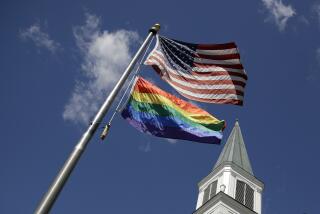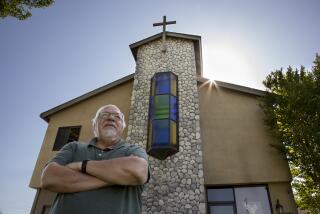Gay Church Gives Up Bid for Council Membership : Denominations: Metropolitan Community Churches accuses national ecumenical body of homophobia. Leaders apply for observer status.
- Share via
The Universal Fellowship of Metropolitan Community Churches, a Los Angeles-based denomination that reaches out mainly to the gay community, has given up hope of full membership in the National Council of Churches--at least for now.
An official of the Metropolitan Community Churches, accusing the nation’s preeminent ecumenical body of homophobia, said it had applied instead for observer status in the council. The request was made Tuesday in a letter to the council from the Rev. Troy Perry, founder of the 27,000-member denomination.
The decision to accept a lesser role was prompted by a council decision earlier this month. On May 19, the council decided to scrap plans for nationwide talks between the Metropolitan Churches and other denominations affiliated with the council. Those include 32 Protestant and Orthodox bodies.
“Justice delayed, justice denied” was the assessment of the Rev. Nancy Wilson, ecumenical officer for the Metropolitan Community Churches, which was founded in 1968 and has 265 churches in 15 countries.
“Our ultimate goal is full membership in the NCC, but we are requesting observer status in order to acknowledge the limits imposed on our relationship by their homophobia,” she said Tuesday.
The announcement comes at a time when gays and lesbians have been fighting vigorously for acceptance in mainline denominations. Membership in the National Council of Churches would be highly symbolic, representing acceptance of homosexuals by mainstream Christians.
Wilson said the denomination “longs for” full membership not only as a matter of church unity but also as a way of protecting its gay and lesbian constituents in what she said are perilous and violent times.
“The more minority groups have connections to groups like the National Council, the safer we can be,” said Wilson. “We need the solidarity with other groups. The more we are isolated, the more our constituency is endangered.”
But the council has problems of its own, some stemming from its image as an ultra-liberal organization. Orthodox Christian groups, which condemn homosexual activities as sinful, threatened to pull out of the council last year, in part because of the group’s perceived support of gay rights.
The Metropolitan Community Churches says being classified as an observer is a less desirable but more realistic goal.
If granted observer status, the organization would join three other bodies with that status: the American Jewish Committee, the U.S. Catholic Conference and the Synagogue Council of North America.
Those groups have a voice but not a vote in most deliberations of the council, which is based in the Interchurch Center in New York.
Metropolitan Community Churches leaders interpret the council’s recent decision to drop plans for a fuller dialogue as a clear indication that it wants to distance itself from a group so strongly identified with gay rights.
The denomination’s request for council membership dates to 1981. Two years later, action on the request was postponed indefinitely by the National Council after Orthodox denominations threatened to leave if the application was approved.
Before this month’s vote, the council had been moving toward closer ties with the Metropolitan Community Churches. Formal talks were under way through a joint committee established in 1990, but the membership application remained on the shelf.
On May 19, the council’s Executive Coordinating Committee decided against expanding the talks beyond the joint committee--and voted to disband the joint committee as of November--after learning that only three or four of the 32 member denominations were interested.
The National Council has now assigned the issue of homosexuality to its Commission on Faith and Order, a move that Wilson criticized.
Wilson noted also that the council has an important role to play in encouraging member denominations to hold discussions with gays and lesbians in their own pews.
The Rev. Morris Floyd, a leader of Affirmation, the gay caucus within the United Methodist Church, said he was saddened at the breakdown in planned talks with the Metropolitan Community Churches.
“I think my major reaction is deep disappointment,” said Floyd. “I do think it is not really surprising in light of what I would call the fear-filled way most of the mainline denominations approach the issue.”
More to Read
Sign up for Essential California
The most important California stories and recommendations in your inbox every morning.
You may occasionally receive promotional content from the Los Angeles Times.













